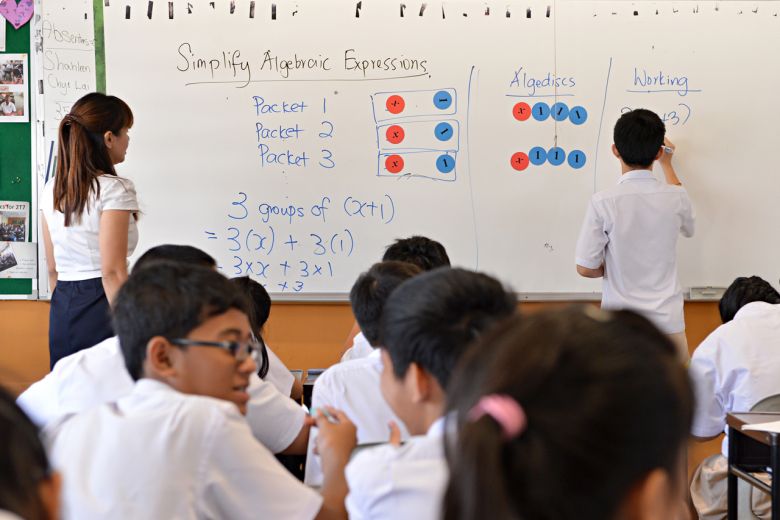China pips Singapore to top spot in Pisa education ranking
Republic's 15-year-olds come second in maths, science and reading covered in OECD study
Sign up now: Get tips on how to help your child succeed

Bedok View Secondary School students learning algebra. In the latest Programme for International Student Assessment, Singapore came in second place in all three subjects covered in the study - mathematics, science and reading.
PHOTO: ST FILE
Singapore's 15-year-olds emerged among the top performers in an international benchmarking study released yesterday that tests how well they apply knowledge and skills, and solve problems.
The Republic slipped from its previous No. 1 position in 2015 to rank second in the latest Programme for International Student Assessment (Pisa), a study done every three years by the Organisation for Economic Cooperation and Development (OECD).
Singapore came in second in all three subjects covered in the study - mathematics, science and reading - losing out to China. In 2015, China was not among the top five scorers.
Macau was ranked third in all three categories, followed by Hong Kong in fourth place for reading and mathematics. Estonia, another top performer, was fourth in science and fifth in reading.
Compared with 2015, Singapore students showed significantly better literacy skills in the latest Pisa test, which focused on reading. They scored higher than the OECD average in higher-order abilities like evaluating content and assessing credibility.
The Ministry of Education (MOE) attributed the improvement in reading to English language curricula in primary and secondary schools that hone critical reading skills across a range of texts, as well as the rising trend of English-speaking homes.
Last year was the fourth time that Singapore took part in Pisa, with the first in 2009. The study involved about 600,000 students from 79 countries and economies.
In Singapore, 6,676 teens, most of whom were in Secondary 4, were randomly selected to take the test. The sample came from all 153 public secondary schools and 13 private schools, which include international and religious schools.
Mr Sng Chern Wei, MOE's deputy director-general of education (curriculum), said: "We are pretty happy with the 2018 Pisa findings because they show that our students are equipped with the critical skills and the resilience to cope with the challenges of a rapidly changing world."
On losing the top spot to China, he said: "We are happy that China is doing well. We didn't take part in Pisa to try to beat every country."
He said that the Pisa results are a useful reference for MOE as it develops education policies and programmes, and it will look into improving problem areas highlighted in the study.
These include a high proportion of students who expressed concern about failure, and a decline in teenagers enjoying reading.
6,676
Number of teens in Singapore randomly selected to take the test. Most were in Secondary 4.
Similar to their international counterparts, Singapore teenagers said they did not like reading as a hobby or read only to get information they needed. For example, 49 per cent of them said reading was a hobby, down from 54 per cent in 2009. In addition, 46 per cent said they read only if they had to, up from 35 per cent in 2009.
National Institute of Education don Jason Tan said that competing demands for students' time due to the rise of smartphones and social media play a key part in the drop in enjoyment of reading as a hobby.
"This whole business of non-stop Instagram and Twitter is much more attractive because it's interactive... compared to reading traditional print books that is a much more solitary activity," he said.
The latest Pisa cycle also showed that Singapore continued to have high proportions of students who did well and low proportions of low performers. In reading, 26 per cent of students in Singapore were top performers. For mathematics and science, the figures were 37 per cent and 21 per cent respectively. The OECD average ranged from 7 per cent to 11 per cent.
Singapore had fewer students who were low performers in reading at 11 per cent, or about half of the OECD average of 23 per cent. The Republic also had markedly lower proportions of low performers in mathematics and science, at 7 per cent and 9 per cent respectively.


